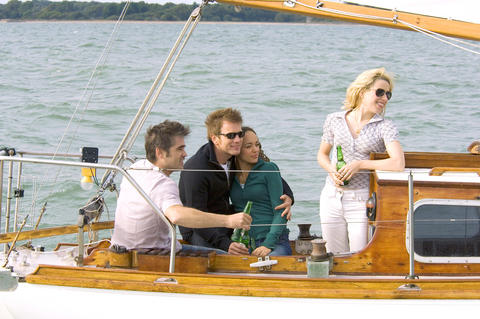Cassandra's Dream, Woody Allen's latest excursion to the dark side of human nature, is good enough that you may wonder why he doesn't just stop making comedies once and for all. Perhaps that's heretical, but it's the view of someone who has accompanied Allen on all his recent follies, The Curse of the Jade Scorpion included, and has too often heard her own laughter die gurgling in her throat from a lack of inspiration. There's nothing remotely funny about Cassandra's Dream, save perhaps that immodest title.
As with his last two films, Match Point and Scoop, Cassandra's Dream takes place in a movie-made London where the picturesque streets can turn into noirish dead ends. A well-matched Ewan McGregor and Colin Farrell play Ian and Terry, brothers in blood and deed. Somewhat flash, with natty suits and a jaunty walk, Ian helps run their father's struggling restaurant; Terry, in turn, works in a garage where the grease creeps under his nails and stays there. Ian dreams of making it big in real estate, while Terry banks on the dog races and the poker table. They're good boys, nice guys, eager to please, fast to smile and as dedicated to each other as to the idea of family.
That idea is put to the cruel test when each brother exceeds his grasp - Ian by sleeping outside his class, Terry by losing large at cards - and both turn to their elusive, wealthy uncle for help. Dropped clumsily into the drama, Uncle Howard (Tom Wilkinson) is a classic deus ex machina who exists simply to push Terry and Ian toward their fates. He doesn't make much sense (he swings into London abruptly), but he doesn't have to; he just has to provide the means for two ordinary men to transform into tragic characters. It's an old story and it fits Allen's pessimism nicely, in part because it's the kind of old story that predates the modern condition and the therapeutic jabber of which he has been so fond.

PHOTO: COURTESY OF SERENITY
Cassandra's Dream owes more to Oedipus Rex than to the Oedipus complex (and something to Claude Chabrol), which doesn't mean that you can't put Ian and Terry on the couch. By all means, do. But the pleasures of this modest film are right on the surface, in the upward curve of McGregor's lips and the reverse lines of Farrell's anguish. Like Allen's instrumental visual style, McGregor's easygoing turn takes time getting used to, partly because, as is almost always the case with this director, the actor seems to have been left to his own devices. But the performance sticks like a knife. It delivers force and feeling, as does Farrell, whose gentleness is seldom used well.
The rest of the cast fares less well, including Wilkinson, who never finds the right pitch for his character or the monstrous fury that his most pivotal scene demands. Allen sets this scene during a rainstorm, which echoes the similarly climactic moment in Match Point, when the secret lovers kiss and set destiny on its brutal path.

Wooden houses wedged between concrete, crumbling brick facades with roofs gaping to the sky, and tiled art deco buildings down narrow alleyways: Taichung Central District’s (中區) aging architecture reveals both the allure and reality of the old downtown. From Indigenous settlement to capital under Qing Dynasty rule through to Japanese colonization, Taichung’s Central District holds a long and layered history. The bygone beauty of its streets once earned it the nickname “Little Kyoto.” Since the late eighties, however, the shifting of economic and government centers westward signaled a gradual decline in the area’s evolving fortunes. With the regeneration of the once

Even by the standards of Ukraine’s International Legion, which comprises volunteers from over 55 countries, Han has an unusual backstory. Born in Taichung, he grew up in Costa Rica — then one of Taiwan’s diplomatic allies — where a relative worked for the embassy. After attending an American international high school in San Jose, Costa Rica’s capital, Han — who prefers to use only his given name for OPSEC (operations security) reasons — moved to the US in his teens. He attended Penn State University before returning to Taiwan to work in the semiconductor industry in Kaohsiung, where he

In February of this year the Taipei Times reported on the visit of Lienchiang County Commissioner Wang Chung-ming (王忠銘) of the Chinese Nationalist Party (KMT) and a delegation to a lantern festival in Fuzhou’s Mawei District in Fujian Province. “Today, Mawei and Matsu jointly marked the lantern festival,” Wang was quoted as saying, adding that both sides “being of one people,” is a cause for joy. Wang was passing around a common claim of officials of the People’s Republic of China (PRC) and the PRC’s allies and supporters in Taiwan — KMT and the Taiwan People’s Party — and elsewhere: Taiwan and

Perched on Thailand’s border with Myanmar, Arunothai is a dusty crossroads town, a nowheresville that could be the setting of some Southeast Asian spaghetti Western. Its main street is the final, dead-end section of the two-lane highway from Chiang Mai, Thailand’s second largest city 120kms south, and the heart of the kingdom’s mountainous north. At the town boundary, a Chinese-style arch capped with dragons also bears Thai script declaring fealty to Bangkok’s royal family: “Long live the King!” Further on, Chinese lanterns line the main street, and on the hillsides, courtyard homes sit among warrens of narrow, winding alleyways and